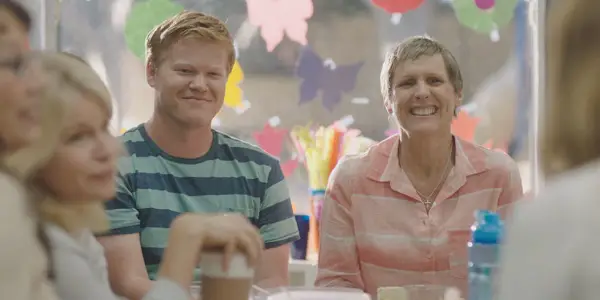When David Mulchaey (Jesse Plemons) returns home to Sacramento to care for his dying mother (Molly Shannon), he must also grapple with his personal failures. After breaking up with his boyfriend of five years and learning of his cancelled Comedy Central pilot, he flies home to avoid this pain and rejection – all the while using his mother’s death as an outlet for human understanding.
In a struggle to accept his mother’s inevitable death, he also must cope with a father, Norman (Bradley Whitford), who refuses to acknowledge his identity as a gay man. Aimless, lost, and confused, David laments that situations like these don’t happen to him. They only happen to other people. Sadly, as his friend Gabe (John Early) points out, he is now other people’s other people. The reality of this idea is heartbreaking, as is the plot of Chris Kelly’s semi-autobiographical film, Other People. But importantly – this is all supposed to be funny.
Coming Back Home
Chris Kelly is no stranger to this deceptively humorous plot. When he began promoting the film through interviews, he was upfront: this film (his first, in fact) was based on his own life. He, too, had a mother pass away in 2009 and he was subjected to subtle hostility from his family regarding his homosexuality. In fact, David’s career as a writer in the film is directly related to Kelly’s, as he began as a writer for The Onion and Funny or Die – later expanding to Saturday Night Live and Broad City. Clearly, there are parallels from real-life to this fictional world that he has crafted.
And perhaps this is what makes Other People so freeing. What bubbles beneath the surface in every scene of this film is subtext; a rich, familial history that is brimming with heart, humor, and ambiguity. The film chronicles David’s return home to California, and each event is catalogued by an on-screen text that tells us the month.
As January unfolds into February, and as February inches toward March, we are presented with questions. How long until the cancer takes his mother, Joanne’s life? When will David start to feel like a normal person again? Will he ever feel like a normal person again?

As we are taken on this year-long journey, the tiny nuances one would expect to find in a family start to form. When David came out ten years ago, Joanne could not accept him. This is not only heartbreaking, but jarring, because Shannon’s portrayal of Joanne is nothing but sweet, supportive, and maternal. It’s a true show-stopping turn. In a scene that thrives on these silent moments, Joanne and David lay side by side on her bed.
With her back turned to him, Joanne apologizes to David for not being there for him when he needed her most. She has lost all of her hair, she is dying, and she finally has the courage to tell David how she regrets the way she treated him. It is moments like these that indicate the strengths Kelly possesses as a storyteller. Insofar as exposition is concerned, he tells us very little. But it is through these subtle acts of intimacy that Other People crackles with life.
Therapeutic Filmmaking
Make no mistake, Other People is a work of fiction. Names have been changed, details altered, but what remains is a story that is told from the heart. We can never truly know what Kelly’s intentions were when he wrote this screenplay. But what I can hope is that he made this movie as an act of healing. There are no frills here, no bells and whistles. Rather, we have a story that is straightforward and deeply personal.
In a final scene that culminates to a showdown between David and his father, we watch as David tears into Norman; picking apart why he cannot accept his son. David relinquishes his feelings of inadequacy, of never feeling like he amounted to much in his father’s eyes. But let’s be clear – this is not a tear-jerking moment. Instead, it feels like an exercise of release. We hear no heartfelt apologies, no begging for forgiveness. We see healing, and moving forward. After all, no bridge can be immediately rebuilt.
In this way, I believe the film functions beyond mere entertainment. Don’t get me wrong – it is hilarious and honest, relatable and compassionate. But perhaps Other People isn’t entirely about us. Rather, it is about first-time screenwriter and director, Chris Kelly. The story is his own, and the film is his way of healing. It is his way of accepting. And ultimately, it is his way of freeing himself from the past.
Bearing all of this in mind, I turn it to you!
How do you think personal narratives in film function as a means of healing – for the viewer and for the filmmaker?
Other People is available on Netflix in the U.S.
Does content like this matter to you?
Become a Member and support film journalism. Unlock access to all of Film Inquiry`s great articles. Join a community of like-minded readers who are passionate about cinema - get access to our private members Network, give back to independent filmmakers, and more.